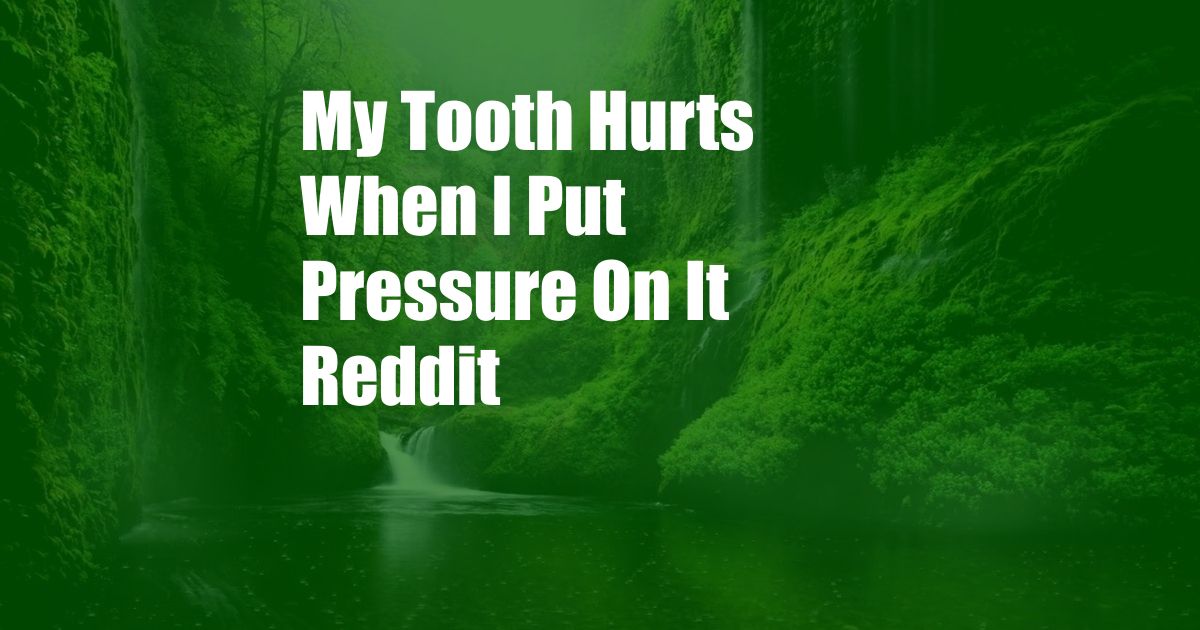
My Tooth Hurts When I Put Pressure On It: What Could Be the Cause?
Have you ever felt a sharp, throbbing pain in your tooth when you bite down on something hard or chew on one side of your mouth? This common problem can be caused by several underlying issues, ranging from minor dental problems to more serious underlying conditions. In this article, we will delve into the potential causes of tooth pain when pressure is applied, exploring various dental conditions and offering expert advice on how to manage the discomfort effectively.
Before delving into the specific causes, it is essential to understand that tooth pain when pressure is applied can be a sign of an active dental problem that requires prompt attention. Seeking professional dental care is crucial to accurately identify the underlying cause and receive appropriate treatment to alleviate the discomfort and prevent further complications.
Understanding Tooth Pain When Pressure Is Applied
Tooth pain when pressure is applied is a common dental complaint that can have several potential causes, including:
- Cavities: Tooth decay, also known as cavities, can erode the tooth’s enamel, creating holes or defects in the tooth structure. When pressure is applied to a decayed tooth, the sensitive dentin underneath becomes exposed, causing pain.
- Cracked or Fractured Teeth: A crack or fracture in a tooth can weaken its structure, making it more susceptible to pain when pressure is applied. Cracks can occur due to trauma, such as biting down on hard objects or grinding teeth at night (bruxism).
- Abscessed Teeth: An abscessed tooth is a severe infection that occurs when bacteria enter the pulp, the innermost part of the tooth. This infection can lead to inflammation, swelling, and excruciating pain, especially when pressure is applied to the affected tooth.
- Gum Disease: Advanced gum disease, also known as periodontitis, can destroy the tissues and bone that support the teeth. This can lead to loose teeth, which may become painful when pressure is applied.
- Bruxism: Bruxism, or teeth grinding, is a common condition that can put excessive pressure on teeth, causing damage to the tooth enamel and underlying dentin, leading to pain.
Tips for Managing Tooth Pain When Pressure Is Applied
If you’re experiencing tooth pain when pressure is applied, there are a few things you can do to manage the discomfort while waiting for professional dental care:
- Over-the-Counter Pain Relievers: Nonsteroidal anti-inflammatory drugs (NSAIDs) like ibuprofen or naproxen can help reduce inflammation and relieve pain.
- Cold Compress: Applying a cold compress to the outside of your cheek near the affected tooth can help numb the pain and reduce swelling.
- Saltwater Rinse: Rinsing your mouth with warm saltwater can help clean the area around the affected tooth and reduce inflammation.
- Avoid Chewing on the Affected Side: Try to avoid chewing on the side of your mouth where the painful tooth is located to minimize pressure and discomfort.
- See a Dentist Promptly: While these measures can provide temporary relief, it’s crucial to seek professional dental care as soon as possible to diagnose the underlying cause and receive appropriate treatment.
Frequently Asked Questions (FAQs)
Q: Why does my tooth hurt when I put pressure on it?
A: Tooth pain when pressure is applied can be caused by various dental issues, such as cavities, cracked teeth, abscessed teeth, gum disease, or bruxism.
Q: What should I do if my tooth hurts when I put pressure on it?
A: If you are experiencing tooth pain when pressure is applied, it is recommended to take over-the-counter pain relievers, apply a cold compress, rinse with saltwater, avoid chewing on the affected side, and seek professional dental care promptly.
Q: Can tooth pain when pressure is applied go away on its own?
A: In most cases, tooth pain when pressure is applied will not go away on its own and requires professional dental treatment to address the underlying cause and alleviate discomfort.
Q: Is it safe to ignore tooth pain when pressure is applied?
A: Ignoring tooth pain when pressure is applied is not recommended, as it may indicate an underlying dental problem that can worsen if left untreated.
Conclusion
Tooth pain when pressure is applied can be a common but concerning dental issue that requires attention. Understanding the potential causes of this pain and knowing how to manage the discomfort can help you take proactive steps while waiting for professional dental care. By seeking prompt treatment and following expert advice, you can alleviate the pain, prevent further complications, and maintain good oral health.
Are you experiencing tooth pain when you put pressure on it? Don’t hesitate to schedule an appointment with your dentist to determine the cause and receive appropriate treatment. Your dental health is important, so take the necessary steps to address any discomfort and maintain a healthy, pain-free smile.